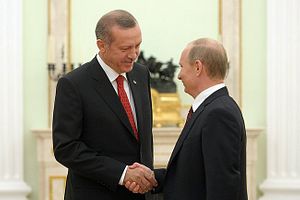Russian President Vladimir Putin and Turkish President Recep Tayyip Erdogan are well on their way to patching up relations. Their meeting on August 9 was a long way from last November when the two countries split nastily over the Turkish downing of a Russian jet on the Turkey-Syria border.
Calling Putin “my friend Vladimir,” Erdogan traveled to Saint Petersburg for a meeting with the Russian president, his first trip abroad since the July 15 coup attempt.
Discussion surrounding the meeting–particularly in the West–view it as part of a convergence between Ankara and Moscow. Marc Pierini, a visiting scholar at Carnegie Europe, wrote that “ an opportunistic convergence of minds” may emerge in Saint Petersburg, “with each having his own reasons.”
There are several interests that work to push Russia and Turkey into alignment: considerable economic and business interests from trade and tourism to construction; the Turkish Stream gas pipeline across the Black Sea; and frustration with Western political judgement and accusations of authoritarianism in both states.
The economic argument has perhaps more sway in Ankara, regardless of the coup attempt. The EBRD last December, as Moscow and Ankara levied sanctions against each other, said that the then-proposed sanctions “may reduce Turkey’s GDP growth in 2016 by around 0.3 – 0.7 percentage points.” The closest connections were in the energy and tourism, with Russia the main supplier of natural gas to Turkey and Russians the country’s second-largest contingent of tourists, making up “12.2 per cent of the 37 million tourist arrivals to Turkey in 2014,” just behind Germans. The impacts of sanctions on Russia, the EBRD said, would be more limited.
The Turkish Stream pipeline is important for both capitals: if completed it would help cement Turkey as a major energy conduit to Europe and promises to transport 63 billions of cubic meters of gas per year from Russia to western Turkey. The Moscow Times reports that the project, which has been frozen at an early state since the jet incident, were to be among the main topics in the Putin-Erdogan meeting.
The third area of mutual interest noted above, that of frustration with Western judgement, has different meanings for each country. Russia, long used to critical comments from the West with regard to democracy, rule of law and human rights has perhaps been able to cultivate a new solidarity with the Turkish president. Turkey, which has considerable political and security ties to the West–best displayed by its NATO membership–has increasingly been criticized for creeping authoritarianism. Even prior to the coup, many in the West questioned state moves against media outlets and opposition voices. After the coup, Erdogan appeared to double down: immediately linking the coup to U.S.-based exiled cleric and former Erdogan friend Fethullah Gulen, arresting thousands and putting out warrants for more than 40 journalists. The post-coup crackdown has lessened the likelihood that the United States will agree to extradite Gulen.
In this vein, Putin’s strident opposition to “all kinds” of coup attempts falls on welcoming Turkish ears.
The elephant in the room–where Russian and Turkish policies have diverged the most in recent years–is Syria. The complex web of actors is enough to tie one’s brain in knots: Russia supports Syrian president Bashar al-Assad, whereas Erdogan has long derided the embattled Syrian president; NATO (of which Turkey is a member) has focused the fight on ISIS while also supporting anti-Assad groups; meanwhile, Russia has been long-accused of specifically targeting anti-Assad militants and hitting, but not very hard, ISIS. But, the United States has also devoted resources to supporting Kurdish militias, much to Erdogan’s frustration. Russia has supported at least one Kurdish militia, according to RFE/RL; but prioritizes Assad remaining in power over supporting the Kurds. If Turkey can budge on Assad, Russia may be willing to budge on supporting Kurdish groups.
Following the resumption of trade and tourism between Russia and Turkey, the clearest likely outcomes from the meeting, eyes will be on Syria once more to see how far the rapprochement will go. A shift in Ankara with regard to Syria has serious repercussions on the NATO coalition’s fight against ISIS.

































